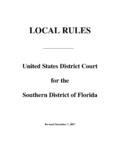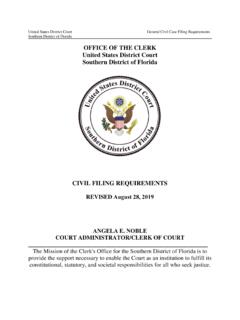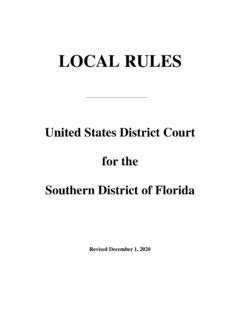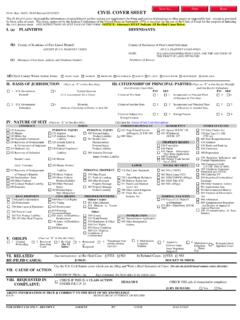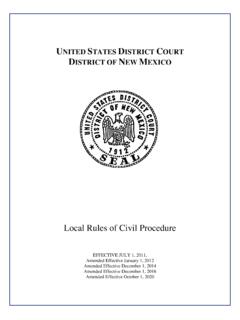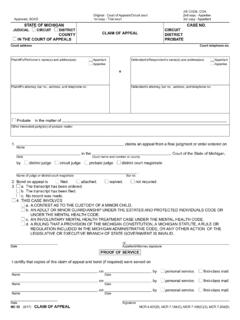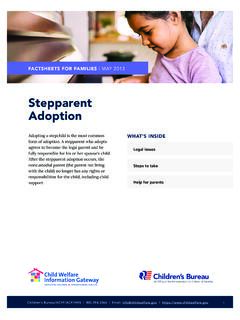Transcription of DISCOVERY OBJECTIONS AND PROCEDURES FOR …
1 DISCOVERY OBJECTIONS AND PROCEDURES FOR magistrate JUDGE LAUREN F. LOUIS The following DISCOVERY rules and PROCEDURES apply in all cases assigned to United States magistrate Judge Lauren F. Louis. I. DISCOVERY OBJECTIONS A. Vague, Overly Broad and Unduly Burdensome Parties shall not make nonspecific boilerplate OBJECTIONS . Such OBJECTIONS do not comply with Local Rule (e)(2)(A), which provides that, when an objection is made to any interrogatory or sub-part thereof or to any document request under Federal Rule of Civil Procedure 34, the objection shall state with specificity all grounds. Blanket, unsupported OBJECTIONS that a DISCOVERY request is vague, overly broad, or unduly burdensome are, by themselves, meaningless, and disregarded by the Court.
2 A party objecting on these bases must explain the specific and particular ways in which a request is vague, overly broad, or unduly burdensome. See Fed. R. Civ. P. 33(b)(4) and 34(b)(2)(B); Panola Land Buyers Ass n. v. Shuman, 762 1550, 1559 (11th Cir. 1985) (citing Josephs v. Harris Corp., 677 985, 992 (3d Cir. 1982)) ( the party resisting DISCOVERY must show specifically how .. each interrogatory is not relevant or how each question is overly broad, burdensome or oppressive. )). If a party believes that the request is vague, that party shall attempt to obtain clarification prior to objecting on this ground. B. Irrelevant Or Not Reasonably Calculated to Lead to Admissible Evidence An objection that a DISCOVERY request is not relevant must include a specific explanation describing why the request lacks relevance and/or why the requested DISCOVERY is disproportionate in light of the factors enumerated in Federal Rule of Civil Procedure 26(b)(1).
3 An objection that a DISCOVERY request is not reasonably calculated to lead to admissible evidence is an outdated type of objection, as that language no longer defines the scope of DISCOVERY in federal court. The current version of Rule 26(b)(1) defines the scope of DISCOVERY as any nonprivileged matter that is relevant to any party s claim or defense and proportional to the needs of the case -- and then lists several factors to analyze. The Court reminds the parties that the Federal Rules provide that information within this scope of DISCOVERY need not be admissible in evidence to be discoverable. See Fed. R. Civ. P. 26(b)(1); see Oppenheimer Fund, Inc. v. Sanders, 437 340, 351-52 (1978). C. OBJECTIONS Based Upon Scope If there is an objection based upon an unduly broad scope, such as time frame or geographic location, DISCOVERY should be provided as to those matters within the scope that are not disputed.
4 For example, if DISCOVERY is sought nationwide for a ten-year period, and the responding party objects on the grounds that only a five-year period limited to activities within the State of Florida is appropriate, the responding party shall provide responsive DISCOVERY falling within the five-year period as to the State of Florida. D. Formulaic OBJECTIONS Followed by an Answer Parties shall not recite a formulaic objection followed by an answer to the request. Federal Rule of Civil Procedure 34(b)(2)(C) specifically requires an objection to state whether any responsive materials are being withheld. See Civil DISCOVERY Standards, 2004 Sec. Lit. 18; see also Fla. (e)(2)(A). Counsel shall include in the answer a clear statement that all responsive documents/information identified have in fact been produced/provided, or otherwise describe the category of documents/information that have been withheld on the basis of the objection.
5 E. OBJECTIONS Based upon Privilege Generalized OBJECTIONS asserting attorney-client privilege or work product doctrine do not comply with the Local Rules. Local Rule (e)(2)(B) requires that OBJECTIONS based upon privilege identify the specific nature of the privilege being asserted, as well as identify such things as the nature and subject matter of the communication at issue, the sender and receiver of the communication and their relationship to each other, among others. Parties are instructed to review this Local Rule carefully, and refrain from OBJECTIONS in the form of: Objection. This information is protected by attorney-client and/or work product privilege. If a general objection of privilege is made without attaching a proper privilege log, the objection of privilege may be deemed waived.
6 The production of non-privileged materials should not be delayed while a party is preparing a privilege log. F. OBJECTIONS to Scope of 30(b)(6) Notices for Depositions OBJECTIONS to the scope of a deposition notice shall be raised by timely serving those OBJECTIONS upon the opposing party in advance of the deposition, not by filing a motion for protective order seeking anticipatory review before the deposition. See King v. Pratt & Whitney, 161 475 ( Fla. 1995); New World Network Ltd. v. M/V Norwegian Sea, No. 05-22916 CIV, 2007 WL 1068124, at *5 ( Fla. Apr. 6, 2007). The better procedure to follow for the proper operation of the Rule is for a corporate deponent to object to the designation topics that are believed to be improper and give notice to the requesting party of those OBJECTIONS , so that they can either be resolved in advance or otherwise.
7 The requesting party has the obligation to reconsider its position, narrow the scope of the topic, or otherwise stand on its position and seek to compel additional answers if necessary, following the deposition. Direct Gen. Ins. Co. v. Indian Harbor Ins. Co., No. 14-20050-CIV-COOKE/TORRES, 2015 WL 12745536, at *1 ( Fla. Jan. 29, 2015). G. Burden to Sustain OBJECTIONS To show that the requested DISCOVERY is objectionable, the burden is on the objecting party to demonstrate with specificity how the objected-to request is unreasonable. Rossbach v. Rundle, 128 F. Supp. 2d 1348, 1354 ( Fla. 2000); Dunkin Donuts Inc. v. Mary s Donuts, Inc., No. 01-0392-CIV-GOLD, 2001 WL 34079319, at *3 ( Fla. Nov. 1, 2001); Milinazzo v. State Farm Ins. Co.
8 , 247 691, 695 ( Fla. 2007). Failure to satisfy this burden will result in entry of an order compelling DISCOVERY under Rule 37. Failure to show that the objecting party s position was substantially justified will result in entry of monetary sanctions under that Rule. If the burden to sustain an objection is satisfied, the requesting party will have to show with specificity how the information is relevant and necessary, and proportional to the particular needs of the case. Lombardi v. NCL (Bahamas) Ltd., No. 15-20966-CIV-COOKE/TORRES, 2015 WL 12085849, at *1 ( Fla. Dec. 11, 2015). II. DISCOVERY DISPUTES If a bona fide DISCOVERY dispute arises notwithstanding the aforementioned guidelines, the parties must first confer in a good faith effort to resolve the dispute in compliance with Fla.
9 (a)(3). Counsel must under this Local Rule certify that good faith efforts were made and describe those efforts by date and means of communication (in person or telephonic; email correspondence alone does not constitute a sufficient conferral). An adequate certificate of conference almost always requires at least one, if not more, personal communication between counsel. The Court may deny relief if counsel fails to abide by this obligation or fails to certify compliance with the Rule. Except as provided below, DISCOVERY disputes shall not be raised by filing DISCOVERY motions under Rule 37. If, after conferring, parties are unable to resolve their DISCOVERY disputes without Court intervention, the Court will set the matter for a hearing.
10 A regular DISCOVERY calendar is held every Thursday afternoon, beginning at 1:00 , at the C. Clyde Atkins United States Courthouse, 301 North Miami Avenue, Eleventh Floor, in Miami, Florida. The party seeking to enforce a DISCOVERY obligation or obtain protection from such an obligation (the movant ) shall utilize the DISCOVERY calendar process. After conferring with the opposing party to confirm available dates/times, the movant shall contact the undersigned s Chambers by sending an email to The subject line of the email shall be Request for DISCOVERY Hearing . The email shall provide the Court with two proposed times on the Court s DISCOVERY calendar within the following fourteen business days where all parties are available.

